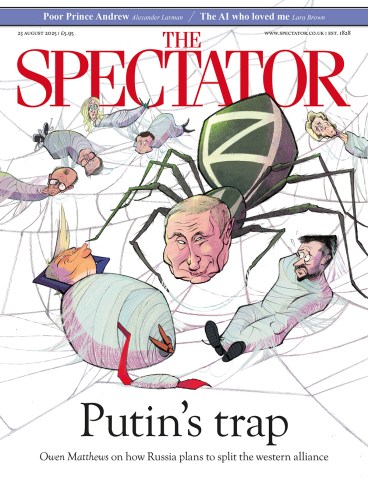
Fighting dirty
Sir: John Power is very interesting (‘Dark matter’, 16 August) when outlining the ‘dark arts’ being proposed by Labour to counter the political threat of Nigel Farage and Reform. This is nothing new of course, with one of the most divisive examples being during the Batley and Spen by-election in 2021, when Keir Starmer’s future was on the line if Labour had lost. During the campaign, a controversial Labour leaflet, clearly designed to appeal to Muslim voters, made a number of criticisms against the then prime minister, Boris Johnson, including a picture of him shaking hands with the Indian prime minister Narendra Modi, with the words: ‘Don’t risk a Tory MP who is not on your side.’ Four years later and we see a picture of a smiling Starmer shaking hands with Modi to celebrate the long-awaited trade deal between the two countries. Political hypocrisy at its worst. Since Starmer has become its leader, Labour run an almighty risk if they go down this route of vilifying opponents as a main thrust of their political campaigning.
Michael Dixon
Sunderland, Tyne and Wear
Trouble in store
Sir: History does not seem to support Matthew Parris’s assertion that most wars end in messy compromises, particularly when they are the consequence of an invasion (16 August). More often than not, either one side is beaten and has to accept defeat or a peace treaty which involves little or no territorial gain – or both sides are exhausted after fighting each other to a standstill and there is little or no change to the status quo. This has been the case from ancient times, for example when Croesus of Lydia invaded Persia or when the Persian kings Darius and Xerxes invaded Greece, right through to the modern day. A messy compromise with Vladimir Putin’s Russia, even were it achievable, would constitute a defeat for Ukraine and would only be storing up further trouble for the future.
Tim Brown
Oxford
Scot free
Sir: Charles Moore is correct about Nicola Sturgeon (Notes, 16 August). For her to say she can’t ‘breathe freely in Scotland’ is beyond hypocrisy. She, more than anyone in the past two decades, is responsible for the downturn in the mood of her country and the stifling of debate not aligned to the SNP. She engineered divisions in Scotland which may take decades to heal. Moving to London to breathe more freely is an opportunity not available to most Scots.
John Roberts
Glasgow
Flicker of possibility
Sir: In your leading article (16 August) you say: ‘Will the last twentysomething to leave Britain please turn out the lights?’ With our curious energy policies, struggling national grid and ever-increasing amounts of energy required for new AI data centres, those last twentysomethings may, of course, find that the lights have gone off already.
Andrew Haynes
London SW6
Bad harvest
Sir: I feel that Craig Raine rather missed the point in his remarks about the painting of ‘The Angelus’ (Arts, 16 August). It may not be numbered among great paintings, but it is a significant painting, and even genuinely iconic. At one time a copy of Millet’s picture hung in almost every peasant home in France – and Ireland – where agricultural workers paused when the Angelus bell rang. ‘People recognised themselves in the dignity the painting conferred on them,’ wrote Patrick Joyce in his fine history Remembering Peasants. He considers it ‘magnificent’ because of what it tells us about social history, and what it meant.
It has also been suggested that the man and woman praying are mourning, and that the basket of potatoes at their feet was painted over what may have been a representation of an infant’s coffin. If this is so, it is even more meaningful.
Mary Kenny
Deal, Kent
A heavenly ride
Sir: Richard Bratby in ‘Ticket to Ride’ (Arts, 16 August) reminds me of a further aspect of train travel in the 1950s and 1960s. My father and I were keen foxhunters accustomed to crossing some of the better ‘countries’ together, through which our London-bound train travelled. We took care to sit by the window nearest the side of the track so that we could imagine ourselves keeping pace while mounted on our excellent hunters (or in my case, a pony). Of course we negotiated every obstacle placed in our path with no difficulty as I recited William Allingham’s ‘Faster than fairies, faster than witches…’ and imagined myself in very heaven.
Marian Waters
Pebworth, Worcestershire
The soul of cricket
Sir: With reference to Henry Blofeld’s Cricket Notebook (9 August) and Tom Stubbs’s letter (16 August), I venture to suggest that the highest, most evocative and essential form of the game is not, in fact, Test cricket, but that played by rural communities on the village green at weekends. There the game has endured for ages past, and there the soul of cricket still resides, in white-clad figures on a sunlit green and in the lengthening shadows and happy banter of a summer evening idyll.
Derrick Gillingham
London SW1
Leg count
Sir: Charles Moore (Notes, 9 August) tells of his family’s game for car journeys, counting legs in pub names. I’ve just passed The Eel’s Foot Inn near Theberton, Suffolk. How would this be scored?
William Pecover
London W6








Comments